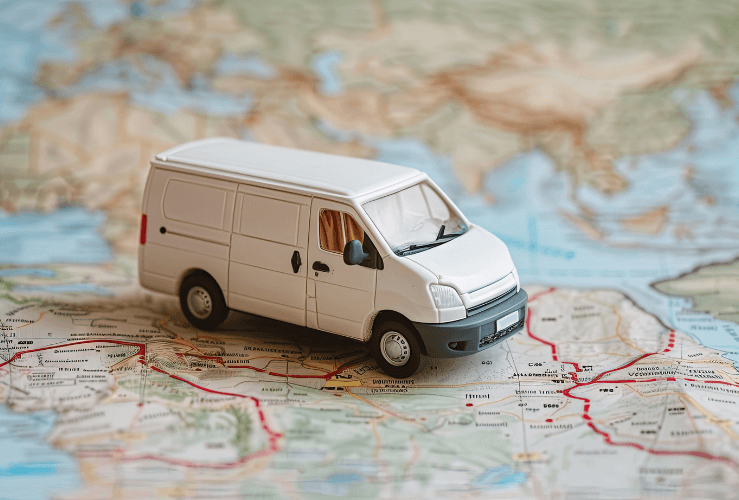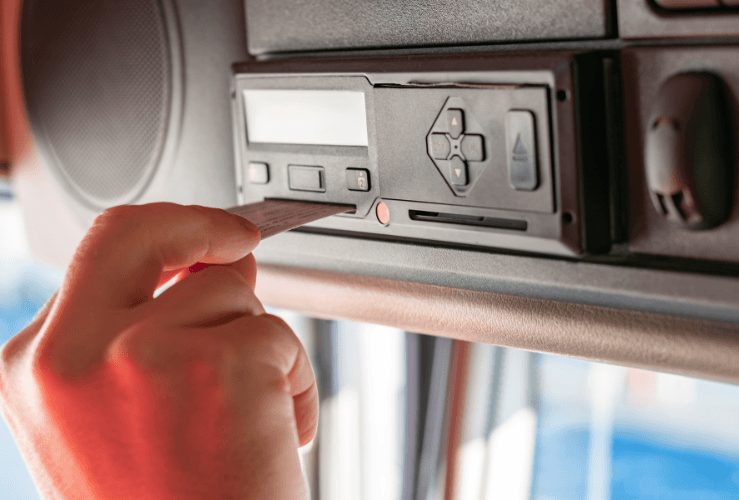What is fleet management? What are the responsibilities of today’s fleet manager? In this guide we’ll cover all you need to know about this important role.
Fleet management is the process of overseeing the day-to-day operations of a fleet of vehicles used by a single company or organisation.
Some form of fleet management is required for any entity that runs multiple vehicles - whether that's a handful or several thousand.

Examples of companies that engage in fleet management:
- Haulage firms
- Delivery services
- Breakdown recovery providers
- Emergency services
What do fleet managers do?
Fleet managers oversee things like:
- Vehicle maintenance
- Vehicle safety
- Fuel consumption and costs
- Driver management
- Asset use
- Route planning
- Productivity
Fleet management: in depth
The fleet manager's role is critical to the ongoing success and growth of a company that operates multiple vehicles as part of its offering - while ensuring safety is front and centre. Here we take a deeper look into the role.
Driver safety
For a company with multiple vehicles out of the depot at any one time, it can be difficult to keep track of where assets are, and if they are being driven safely. Safe driving behaviour is of course essential for the safety of the other road users, the general public - and the drivers themselves.
Fleet managers use a variety of technologies to keep tabs on drivers and their vehicles, including vehicle tracking systems and dash cams. This real-time information makes fleet operations safer and more efficient.
Driver satisfaction and retention
Finding - and keeping - drivers has been a huge issue for companies across the UK in recent years. As such, driver retention has become a key focus of fleet managers, who may implement a variety of initiatives to keep their drivers happy. These measures might include improvement in workplace conditions, service bonuses, and simply maintaining good working relationships.
Keeping track of vehicles
Even if a company has only a handful of vans, keeping tabs on exactly where they are during a given day can be challenging. But for firms with hundreds of vehicles out of the depot at any one time, tracking locations can be impossible without harnessing technologies such as GPS (global positioning system) systems.

Adhering to tachograph rules
If any vehicle in a fleet falls under EU or AETR rules (i.e. they are driven in the EU), a tachograph must be fitted. This records information about speed, driving time, and distance covered.
All commercial vehicles registered after 2006 must be fitted with digital tachographs (not analogue) for EU use. These record driving information and store it on smart cards so it can be checked later.
Investing in new vehicles and disposal of old ones
Vehicle acquisition is a necessary part of running any fleet. But which models to buy - and when - can be complex.
Replacing a vehicle before strictly necessary would create downward pressure on a firm's finances, but failure to acquire new vehicles in a timely fashion might lead to multiple failures in a given period and the inability to carry out activities efficiently.
Managers must also ensure the existing fleet is capable of handling new company objectives and market demands.
Additionally, a fleet manager must consider if their existing drivers are eligible to drive certain new vehicle classes, and if extra training is needed.
Cost management
The cost of maintenance, fuel and general operations can be significant. One of the key roles of the fleet manager is to identify ways of reducing these costs without impacting day-to-day objectives or safety.
Fleet management software and vehicle telematics
A raft of fleet management software is on the market, designed to help managers keep tabs on vehicle locations in real time, develop fuel saving initiatives, support driver performance and increase overall efficiency.
Many software options enable a manager to see multiple data in a single interface. Some packages even enable API integration of temperature and tyre pressure applications.
Most popular packages can be accessed on desktop, tablet - or even smartphone. This flexibility means data can be accessed on the go, from any location.

7 operational priorities for fleet managers
Being proactive about safety
Safety is of prime importance for good fleet management. A collision, for example, could result in a significant financial loss and a dip in productivity - not to mention injury or worse to drivers or other road users.
With so many dangers involved in fleet operations, it's essential drivers carry out regular inspections to ensure their vehicles are safe before they depart.
Ensuring fleet vehicle maintenance is easy and accessible
Successful management relies on harnessing fleet management software and apps to support inspections, scheduling, and reporting; these technologies are far more efficient than depending on spreadsheets and paper documentation.
Using real time metrics
Metrics such as cost-per-mile, total cost of ownership, and other expenses can identify process issues and acquisition needs quickly. Good fleet data helps managers make informed decisions.
Digital documentation
Storing work orders, invoices, manuals, and other critical documents in one place digitally saves time, hassle, and money.
Setting goals and expectations
By setting clear goals and expectations for fleet drivers and other staff, both visibility and accountability are easier. For example, this might include incentivising or encouraging drivers to adhere to maintenance schedules, or fully document any accidents.
Tracking asset usage to inform acquisition needs
With real-time tracking of assets, a fleet manager will be able to determine the optimal fleet size, and make better purchase and disposal decisions. This real-time tracking would include things like vehicle age, mileage, and utilisation.
Keeping tabs on industry advances
The fleet industry is constantly evolving, so it's important to stay on top of new technologies and industry trends. New technologies, for example, can help automate tasks that were previously human resource intensive.
Looking for business breakdown cover?
At Start Rescue, we offer comprehensive business breakdown cover to keep your business vehicles on the road, whether you have a single van or a large commercial fleet. Enjoy reliable protection for cars, motorcycles, vans, and more, ensuring your business stays productive.



